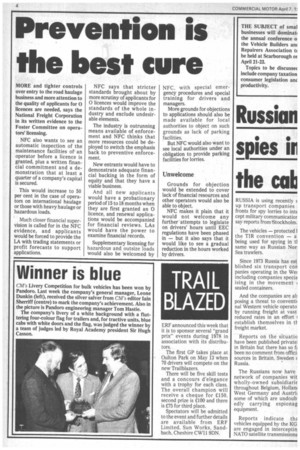Prevention is the best cure
Page 6

If you've noticed an error in this article please click here to report it so we can fix it.
MORE and tighter controls over entry to the road haulage business and more attention to the quality of applicants for 0 licences are needed, says the National Freight Corporation in its written evidence to the Foster Committee on operators' licensing.
NFC also wants to see an automatic inspection of the maintenance facilities of an operator before a licence is granted, plus a written financial commitment and a demonstration that at least a quarter of a company's capital is secured.
This would increase to 50 per cent in the case of operators on international haulage or those with heavy haulage or hazardous loads.
Much closer financial supervision is called for in the NFC evidence, and applicants would be forced to provide the LA with trading statements or profit forecasts to support applications. NFC says that stricter standards brought about by more scrutiny of applicants for 0 licences would improve the standards of the whole industry and exclude undesirable elements.
The industry is outrunning means available of enforcement and NFC thinks that more resources could be deployed to switch the emphasis back to preventive enforcement.
New entrants would have to demonstrate adequate financial backing in the form of equity and that they have a viable business.
And all new applicants would have a probationary period of 15 to 18 months when they are first granted an 0 licence, and renewal applications would be accompanied for financial reviews. LAs would have the power to examine financial records.
Supplementary licensing for hazardous and outsize loads would also be welcomed by NFC, with special emergency procedures and special training for drivers and managers.
More grounds for objections to applications should also be made available for local authorities to object on such grounds as lack of parking facilities.
But NFC would also want to see local authorities under an obligation to provide parking facilities for lorries.
Unwelcome
Grounds for objection would be extended to cover lack of financial resources and other operators would also be able to object.
NFC makes it plain that it would not welcome any further attempts to legislate on drivers' hours until EEC regulations have been phased in — but it also says that it would like to see a gradual reduction in the hours worked by drivers.








































































































































